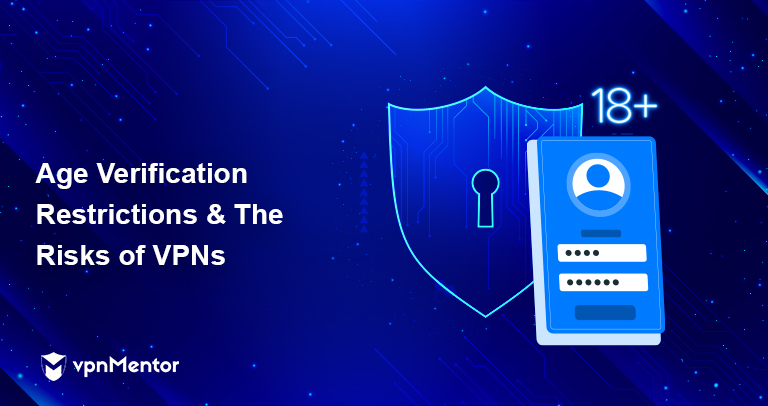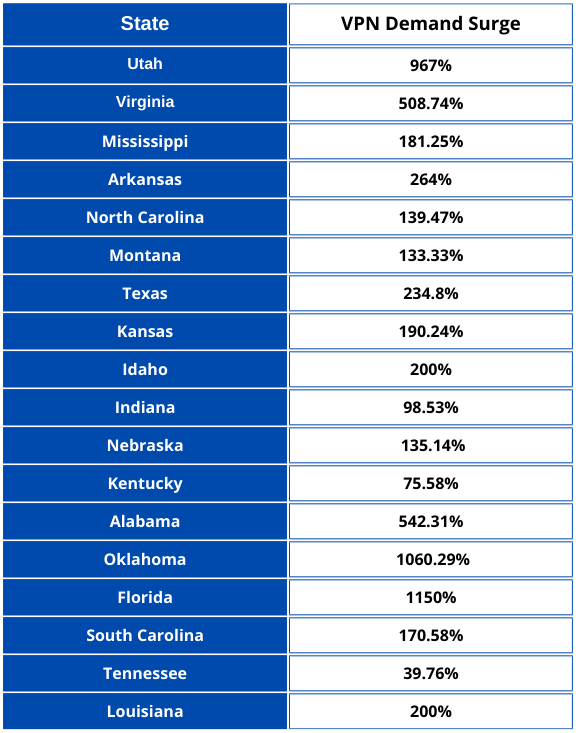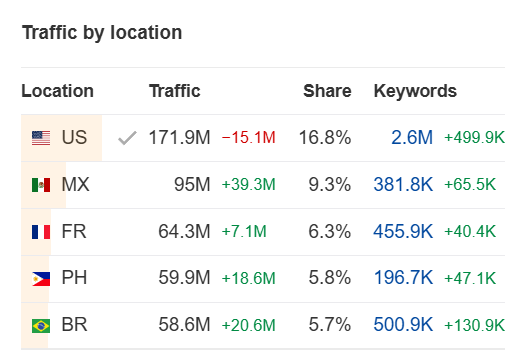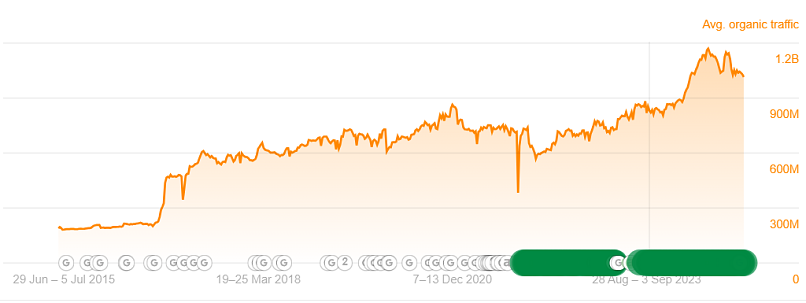Age Verification Restrictions & The Risks of VPNs

vpnMentor’s Research Team recently conducted extensive research on the increasing demand for VPNs in the US and its effect on Pornhub's traffic — and a nuanced picture emerged. The data shows how age verification laws, geo-blocking, and user behavior are shaping online privacy and content access. By analyzing VPN usage and traffic patterns, we gain insight into the evolving digital landscape, its implications and potential risks for users.
In recent years, the implementation of age verification laws for adult content websites has sparked a significant surge in VPN demand across various states in the United States. As one of the largest adult content platforms, Pornhub's decision to apply age verification only in Louisiana while IP-blocking the rest of the states where this law has been implemented has led to a significant rise in both VPN usage and adult website traffic.
The data paints a clear picture of the soaring demand for VPN services in states such as Florida (1,150%), Oklahoma (1,060%), Utah (967%), and Alabama (542%), among others. This surge in VPN usage suggests users are circumventing the IP-block and accessing Pornhub (and other restricted websites) through IPs where the block is not implemented.
The use of VPNs has become a popular workaround for individuals seeking unrestricted access to online content. Thus, despite the geo-blocking measures, Pornhub's traffic reached an all-time high, surpassing 1.8 billion visits by late 2024.
 This list shows VPN demand surge by state according to vpnMentor’s Research Team’s data.
This list shows VPN demand surge by state according to vpnMentor’s Research Team’s data.
While Pornhub has experienced a loss of 15 million visits from the USA — most likely due to the geo-blocking of 18 states — it has gained over 150 million visits globally. Mexico emerged as a significant source of traffic, purportedly driving 39 million users to the adult website in December 2024. This shift in user behavior points to the possibility that individuals from blocked states may not only be resorting to VPNs, but they may also be using IPs from other countries (like Mexico) to access the platform.
 This screenshot shows Pornhub’s traffic by country in December 2024. The countries listed are the five with the highest number of Pornhub visitors.
This screenshot shows Pornhub’s traffic by country in December 2024. The countries listed are the five with the highest number of Pornhub visitors.
Despite initial setbacks in 2021 — back when Pornhub faced a drastic decline in traffic following the implementation of stricter content guidelines and payment restrictions — the platform has since rebounded and seen consistent growth in traffic. Nowadays, Pornhub has 500+ million more users than its closest competitor.
 This graphic shows Pornhub’s global traffic trends ever since 2015.
This graphic shows Pornhub’s global traffic trends ever since 2015.
 This screenshot shows Pornhub’s traffic by the end of December 2024. According to the data, over 85% of Pornhub’s visits come from mobile devices.
This screenshot shows Pornhub’s traffic by the end of December 2024. According to the data, over 85% of Pornhub’s visits come from mobile devices.
 This screenshot shows a comparison of Pornhub’s traffic against its closest competitors.
This screenshot shows a comparison of Pornhub’s traffic against its closest competitors.
The surge in Pornhub’s website traffic was likely an unintended consequence of the implementation of age verification laws — and it was only possible due to VPNs’ IP-changing features. So far in 2025, the United States has seen an increase in the demand for VPN services of around 30% compared to late 2024, and after minutes TikTok was banned for a few hours in the country last sunday it surged to 1566% before it started to diminish, highlighting a broader trend towards increased reliance on these privacy tools.
However, this sudden increase of VPN users raises concerns about privacy and security. Users in geo-blocked locations using VPNs to access Pornhub may face potential risks — especially if they opt for free or nonsecure VPN providers.
Since 2020, we’ve been covering different incidents that highlight the dangers of using unreliable VPN services. For instance, data breaches have exposed hundreds of millions of records of sensitive information such as email addresses, passwords, payment details, and personal device data.
Furthermore, the leak of over a billion records from supposedly "no-logs" VPNs emphasize the vulnerabilities associated with inadequate privacy measures. Leaked data containing geolocation details and unique identifiers raises concerns about identity theft and unauthorized access to personal information.
The exposure of such confidential data can have severe repercussions, including identity theft, financial fraud, unauthorized surveillance, spam, phishing attempts, unauthorized approximate geographic location, DoS attacks, and more.
We recommend users to exercise caution when selecting a VPN provider and to prioritize security features so they can better safeguard their online privacy. To mitigate the risks associated with using VPNs, consider the following criteria when choosing a provider:
- Strong encryption: Opt for a VPN service that offers robust encryption protocols like AES-256 bit encryption to data transmission.
- No-logs policy: Select a provider with a strict no-logs policy to protect your browsing activity and connection logs from being stored or shared.
- Kill switch feature: Look for a VPN service that includes a kill switch mechanism to automatically disconnect your device from the internet if the VPN connection drops, preventing data leaks.
- DNS leak protection: Ensure that the VPN service you choose has built-in DNS leak protection to prevent your DNS requests from being exposed to third parties and maintain anonymity while browsing.
By prioritizing these essential features, users can enhance their online security and privacy when utilizing VPN services.
The increasing demand for VPNs in response to age verification laws highlights the changing landscape of online privacy and content access. As online content regulations evolve, it is crucial for individuals to safeguard their digital presence, privacy, and data integrity.
While VPNs offer a valuable tool for accessing restricted content and safeguarding personal information, it is crucial to exercise caution and select reputable providers that prioritize user privacy.
It is important to note that while VPNs can offer enhanced privacy and security benefits, they should not be used for illegal activities. vpnMentor neither encourages nor condones the misuse of VPNs for unlawful purposes. It is crucial for users to understand the legal implications of their online activities and to use VPN services responsibly.



Please, comment on how to improve this article. Your feedback matters!